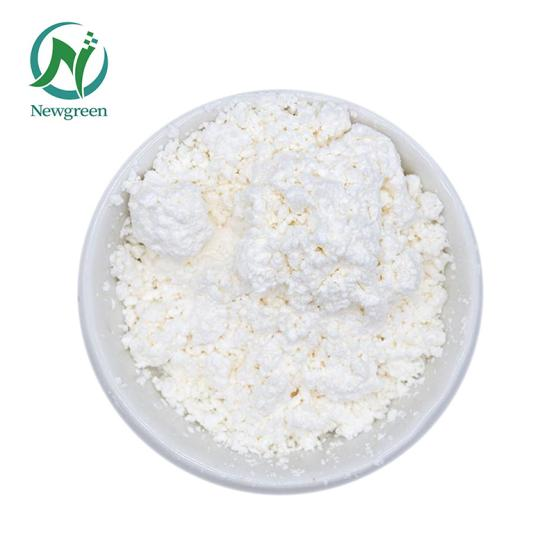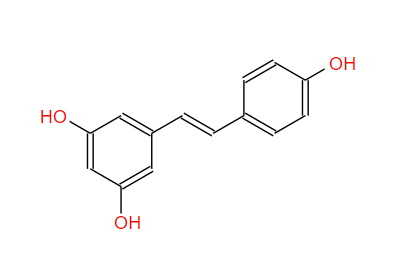
What Is Resveratrol ?
Resveratrol is a natural compound found in certain plants, fruits, and red wine. It belongs to a group of compounds called polyphenols, which act as antioxidants and are known for their potential health benefits. Resveratrol is particularly abundant in the skin of red grapes and has been the subject of numerous studies due to its potential effects on various aspects of health.
Some research suggests that resveratrol may have potential benefits for heart health, as it may help support healthy blood vessels and circulation. Additionally, it has been studied for its potential anti-inflammatory and antioxidant properties, which could have implications for overall health and aging processes.
Resveratrol has also been investigated for its potential role in supporting brain health and cognitive function, as well as its effects on metabolism and potential benefits for weight management.
Physical and Chemical Properties of Resveratrol
Resveratrol (3-4'-5-trihydroxystilbene) is a non-flavonoid polyphenol compound. Its chemical name is 3,4',5-trihydroxy-1,2-diphenylethylene (3,4',5-trihydroxystilbene), its molecular formula is C14H12O3, and its molecular weight is 228.25.
The pure resveratrol appears as a white to light yellow powder, odorless, insoluble in water, and easily soluble in organic solvents such as ether, chloroform, methanol, ethanol, acetone, and ethyl acetate. The melting point is 253-255°C, and the sublimation temperature is 261°C. It can turn red with alkaline solutions such as ammonia water, and can react with ferric chloride-potassium ferrocyanide. This property can be used to identify resveratrol.
Natural resveratrol has two structures, cis and trans. It mainly exists in the trans conformation in nature. The two structures can be combined with glucose to form cis and trans resveratrol glycosides. Cis- and trans-resveratrol glycosides can release resveratrol under the action of glycosidase in the intestine. Under ultraviolet light, trans-resveratrol can be converted into cis-isomers.
Preparation Method
Natural plant extraction method
Grapes, knotweed and peanuts are used as raw materials to extract and separate crude resveratrol, and then purify it. The main crude extraction technologies include organic solvent extraction, alkaline extraction and enzyme extraction. New methods such as microwave-assisted extraction, CO2 supercritical extraction and ultrasonic-assisted extraction are also used. The purpose of purification is mainly to separate the cis- and trans-isomers of resveratrol and resveratrol from the crude resveratrol to obtain trans-resveratrol. Common purification methods include chromatography, silica gel column chromatography, thin layer chromatography, high performance liquid chromatography, etc.
Synthesis method
Since the content of resveratrol in plants is very low and the extraction cost is high, the use of chemical, biological, genetic engineering and other methods to obtain resveratrol has become an indispensable means in its development process. Perkin reaction, Hech reaction, and Witting-Hormer reaction are relatively mature chemical methods for synthesizing resveratrol, with yields of 55.2%, 70%, and 35.7% respectively. Genetic engineering technology is used to control or improve the biosynthesis pathway of resveratrol to obtain high-yield plant strains; methods such as using mutagenesis to select high-yield cell lines can increase the resveratrol yield by 1.5~3.0 times.


What Is The Benefit Of Resveratrol ?
Resveratrol has been the subject of research due to its potential health benefits. Some of the potential benefits of resveratrol include:
1.Anti-aging
In 2003, Harvard University professor David Sinclair and his team discovered that resveratrol can activate acetylase and increase the life span of yeast, which triggered an upsurge in anti-aging research on resveratrol. Howitz et al. found that resveratrol can serve as the strongest activator of silent information regulation 2 homolog1 (SIRT1), can simulate the anti-aging response of calorie restriction (CR), and participate in the regulation of the average life span of organisms. . CR is a strong inducer of SIRT1 and can increase the expression of SIRT1 in organs and tissues such as the brain, heart, intestine, kidney, muscle and fat. CR can cause physiological changes that delay aging and extend lifespan, the most significant of which can be extended by 50%. . Studies have confirmed that resveratrol can extend the life span of yeast, nematodes, fruit flies and lower fish.
2.Anti-tumor, anti-cancer
Resveratrol has significant inhibitory effects on various tumor cells such as mouse hepatocellular carcinoma, breast cancer, colon cancer, gastric cancer, and leukemia. Some scholars have confirmed that resveratrol has a significant inhibitory effect on melanoma cells through MTT method and flow cytometry.
There are reports that resveratrol can enhance cancer radiotherapy and effectively inhibit the effects of cancer stem cells. But so far, due to the complexity of resveratrol's anti-tumor mechanism, researchers have not yet reached a consensus on its mechanism of action.
3.Prevent and treat cardiovascular disease
Epidemiological studies have found that the "French paradox" phenomenon is that French people consume a large amount of fat on a daily basis, but the incidence and mortality of cardiovascular diseases are significantly lower than other European countries. This phenomenon may be related to their daily consumption of large amounts of wine. , and resveratrol may be its main active protective factor. Research shows that resveratrol can regulate blood cholesterol levels by binding to estrogen receptors in the human body, inhibit platelets from forming blood clots and adhesion to the blood vessel walls, thereby inhibiting and reducing the occurrence and development of cardiovascular disease, and reducing the risk of heart disease in the human body. Risk of vascular disease.
4.Antioxidant Support: Resveratrol acts as an antioxidant, helping to protect cells from oxidative damage caused by free radicals. This may have implications for overall health and aging processes.
6. Brain Health: Research has explored the potential role of resveratrol in supporting brain health and cognitive function, with some studies suggesting neuroprotective properties.
7.Metabolism and Weight Management: Resveratrol has been investigated for its potential effects on metabolism and its role in supporting healthy weight management.
What Is The Applications Of Resveratrol ?
Resveratrol has various applications and is used in different fields due to its potential health benefits. Some of the applications of resveratrol include:
1. Dietary Supplements: Resveratrol is commonly used in dietary supplements, often marketed for its potential antioxidant and anti-aging properties.
2. Skincare Products: Resveratrol is included in some skincare products due to its antioxidant properties, which may help protect the skin from environmental damage and support overall skin health.
3. Functional Foods and Beverages: Resveratrol is sometimes added to functional foods and beverages, such as energy drinks and health-focused food products, to provide potential health benefits.
4. Research and Development: Resveratrol continues to be the subject of scientific research, with ongoing studies exploring its potential applications in various health conditions and its effects on aging, metabolism, and overall well-being.
What Is The Downside Of Resveratrol ?
While resveratrol has been studied for its potential health benefits, it's important to consider potential downsides or limitations associated with its use. Some considerations regarding the downside of resveratrol include:
1. Limited Bioavailability: Resveratrol has relatively low bioavailability, meaning that the body may not absorb and utilize it efficiently when taken orally. This can affect its effectiveness in producing the desired health effects.
2. Lack of Standardization: The quality and concentration of resveratrol supplements can vary, and there is a lack of standardization in the production of these supplements. This can make it challenging for consumers to determine the appropriate dosage and quality of the product.
3. Potential Interactions: Resveratrol may interact with certain medications or health conditions. It's important to consult with a healthcare professional before using resveratrol, especially if you are taking other medications or have specific health concerns.
4. Research Limitations: While some studies have shown promising results, further research is needed to fully understand the long-term effects, optimal dosage, and potential risks associated with resveratrol supplementation.
As with any supplement, it's advisable to approach the use of resveratrol with caution and under the guidance of a healthcare professional, especially if you have specific health concerns or are taking other medications.

Related Questions You May Interested In :
Who should avoid resveratrol ?
Certain individuals should exercise caution or avoid resveratrol, especially in concentrated supplement form. It's advisable for the following groups to consult with a healthcare professional before using resveratrol:
1. Pregnant or Breastfeeding Women: Due to limited research on the effects of resveratrol during pregnancy and breastfeeding, it's recommended for pregnant or breastfeeding women to seek guidance from a healthcare professional before using resveratrol supplements.
2. Individuals Taking Blood Thinners: Resveratrol may have mild anticoagulant properties, so individuals taking blood-thinning medications should consult with a healthcare professional before using resveratrol to avoid potential interactions.
3. Those with Hormone-Sensitive Conditions: Resveratrol has been studied for its potential effects on hormone regulation, so individuals with hormone-sensitive conditions or those undergoing hormone therapy should use resveratrol with caution and under medical supervision.
4. Individuals with Liver Conditions: Some studies have suggested that high doses of resveratrol may have effects on the liver. Individuals with liver conditions or those taking medications that affect the liver should use resveratrol with caution and under medical supervision.
As with any supplement, it's important to consult with a healthcare professional before using resveratrol, especially if you have specific health concerns, are taking medications, or have underlying health conditions.
What does resveratrol do to skin ?
Resveratrol is believed to offer several potential benefits for the skin, which has led to its inclusion in skincare products. Some of the effects of resveratrol on the skin may include:
1. Antioxidant Protection: Resveratrol acts as an antioxidant, helping to neutralize free radicals and reduce oxidative stress in the skin. This can potentially protect the skin from environmental damage, such as UV radiation and pollution.
2. Anti-Aging Properties: Resveratrol is thought to have anti-aging effects, as it may help reduce the appearance of fine lines and wrinkles, improve skin elasticity, and support overall skin health.
3. Anti-Inflammatory Effects: Resveratrol has been studied for its potential anti-inflammatory properties, which may help soothe and calm the skin, particularly for individuals with sensitive or reactive skin.
4. Skin Brightening: Some research suggests that resveratrol may contribute to skin brightening and evening out skin tone, potentially reducing the appearance of hyperpigmentation.
What food is highest in resveratrol ?
Foods that are highest in resveratrol include:
1. Red Grapes: Resveratrol is particularly abundant in the skin of red grapes, making red wine a source of resveratrol. However, it's important to consume alcohol in moderation, and other sources of resveratrol may be preferred for non-drinkers.
2. Peanuts: Certain types of peanuts, especially the skin of the peanut, contain notable amounts of resveratrol.
3. Blueberries: Blueberries are known for their antioxidant content, and they also contain resveratrol, although in smaller amounts compared to red grapes and peanuts.
4. Cranberries: Cranberries are another source of resveratrol, providing a modest amount of this compound.
5. Dark Chocolate: Some varieties of dark chocolate contain resveratrol, offering a delicious way to incorporate this compound into the diet.
Is it okay to take resveratrol every day ?
The decision to take resveratrol every day should be made in consultation with a healthcare professional, especially if considering resveratrol supplementation. While resveratrol is generally considered safe when consumed in amounts commonly found in foods, the safety and potential benefits of daily resveratrol supplementation may vary based on individual health status, existing medical conditions, and other medications being taken.
Is resveratrol toxic to the liver ?
Resveratrol has been studied for its potential effects on the liver, and while it is generally considered safe when consumed in amounts commonly found in foods, there is some evidence to suggest that high doses of resveratrol may have effects on the liver. Some studies have indicated that high doses of resveratrol could potentially lead to liver toxicity in certain circumstances.
It's important to note that the research on this topic is ongoing, and the potential for liver toxicity may be influenced by factors such as the dosage, duration of use, and individual health conditions. As with any supplement, it's advisable to consult with a healthcare professional before using resveratrol, especially if you have specific health concerns or are taking other medications that may affect liver function.
Is resveratrol bad for kidneys ?
There is limited evidence to suggest that resveratrol is bad for the kidneys. However, as with any supplement, it's important to approach its use with caution, especially if you have existing kidney conditions or are taking medications that may affect kidney function. It's advisable to consult with a healthcare professional to determine whether resveratrol supplementation is appropriate for your individual health needs, particularly if you have concerns about its potential impact on kidney health.
What not to mix with resveratrol ?
When considering resveratrol supplementation, it's important to be aware of potential interactions with other substances. Some considerations for what not to mix with resveratrol include:
1. Blood-Thinning Medications: Resveratrol may have mild anticoagulant properties, so it's important to use caution when taking resveratrol alongside blood-thinning medications, as it may increase the risk of bleeding.
2. Other Antioxidant Supplements: While antioxidants are generally beneficial, taking high doses of multiple antioxidant supplements simultaneously may have unintended effects. It's advisable to consult with a healthcare professional before combining resveratrol with other antioxidant supplements.
3. Certain Medications: Resveratrol may interact with specific medications, including those metabolized by the liver. It's important to discuss potential interactions with a healthcare professional, especially if you are taking other medications.
As with any supplement, it's important to seek guidance from a healthcare professional to determine the most appropriate use of resveratrol based on individual health status and potential interactions with other substances.
Can I use vitamin C with resveratrol?
Yes, you can generally use vitamin C with resveratrol. In fact, some research suggests that combining resveratrol with vitamin C may enhance the antioxidant effects of both compounds. Vitamin C is a well-known antioxidant that can complement the potential benefits of resveratrol. However, as with any supplement combination, it's advisable to consult with a healthcare professional to ensure that the combination is appropriate for your individual health needs and to discuss any potential interactions or considerations.
Post time: Sep-09-2024





